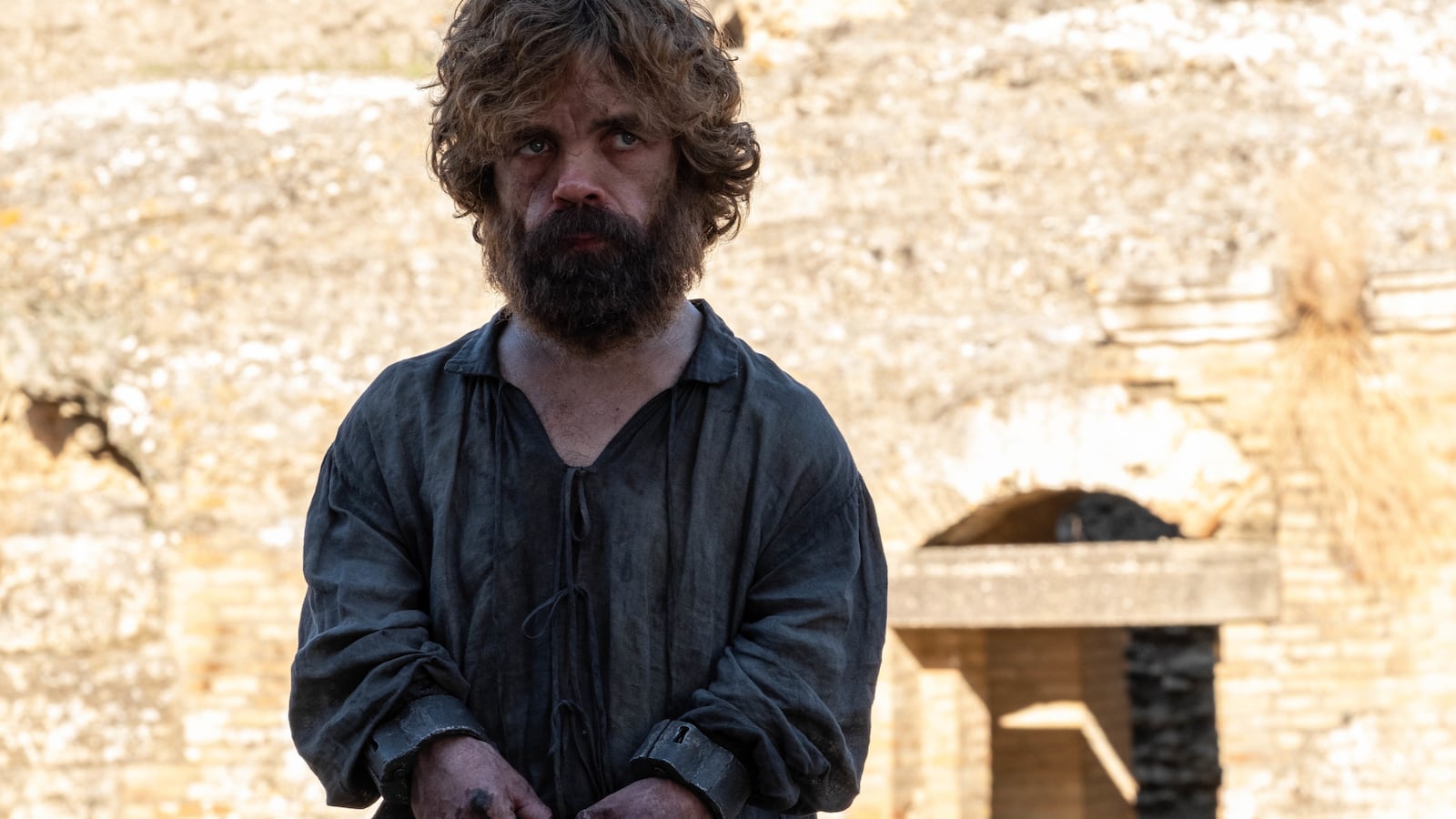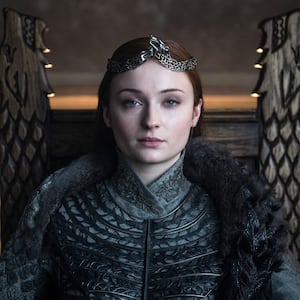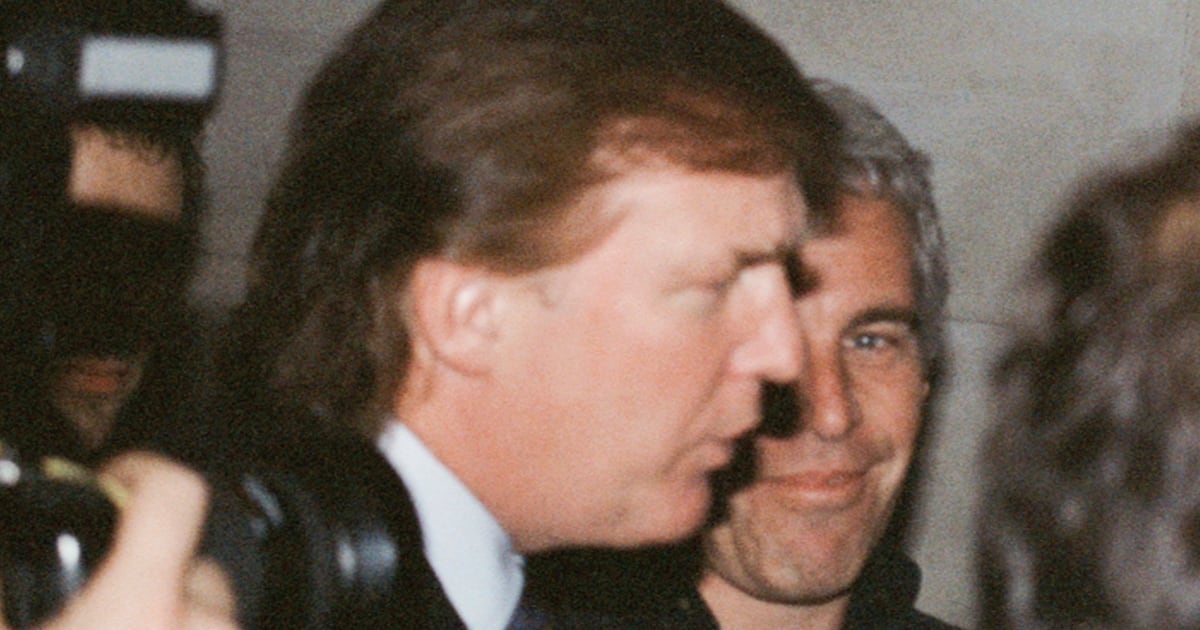“I once brought a jackass and a honeycomb into a brothel.”
Those were some of the last words spoken on Game of Thrones, the series hailed as one of the best dramas ever on TV, and perhaps the last major television cultural phenomenon we’ll have, at least in the traditional sense.
(Caution: Major spoilers ahead.)
It sort of happens like a horror show. Tyrion (Peter Dinklage), now the hand of King Bran (Isaac Hempstead Wright), conducts what appears to be his first small council meeting in the service of rebuilding the recently-destroyed kingdoms.
Bronn (Jerome Flynn), the new Master of Coin, discusses debt and playfully bickers with Davos (Liam Cunningham) over funding the rebuilding of an armada. Samwell Tarly (John Bradley) is assigned to look into potential infrastructure for providing citizens with clean water. Then the whole thing devolves when Bronn laments that all the best brothels burned down during the wars. No worries; he’s willing to fund their reconstruction.
Ser Brienne of Tarth (Gwendoline Christie) tries to salvage the conversation with the logic that rebuilding ships should take precedence over rebuilding brothels. “I think that’s a very presumptuous statement,” Bronn says, maybe kidding? And that leads to Tyrion’s nostalgic non-sequitur about the jackass, the honeycomb, and the brothel.
The camera starts to pan to a wide shot as a lilting score kicks in, and that’s when the fear starts. No…they won’t…it can’t be…the last conversation on Game of Thrones, this hallowed series heralded for its sophisticated storytelling, is a bunch of men interrupting the woman who wants to get to work in order to joke about brothels???
There’s a fleeting sigh of relief. Roughly 10 more minutes follow. It’s not the end. But the wordless montage of the Stark children embarking on their new life paths contains almost no dialogue. (There is a chant of the “Queen in the North” for Sansa.)
The final words spoken onscreen by a named character on Game of Thrones concerned the rebuilding of brothels.
It’s truly wild. It also may be the one thing that happened in the finale that seemed to fit in with the spirit of the series’ origins.
We’ve written about this at length—and we’re hardly the only person to do so—but one of the ugliest legacies to present itself during this final run of Game of Thrones episodes was the ways in which the series failed its female characters and adhered to an almost baffling narrative underscore of misogyny.
Not only has the show’s writing of these women been problematic from a modern purview, but the latest controversial plot twists fell out of line with how we’ve known these characters to behave for the last eight years, and the decisions they’ve made were arguably demeaning, too. That is, when they weren’t seen as entirely expendable.
For much of its run, Game of Thrones exalted its female characters as its heroes, the most powerful, cunning, intelligent forces outlasting—and in some cases even holding the puppet strings of—the bevy of foolish men that surrounded them. But these last episodes undermined that image entirely, a devolution almost cartoonishly punctuated by a final conversation in which those foolish men are back in seats of power, joking about brothels.
Everything we wrote about in our previous post on the matter two weeks ago (read it here) continues to hold true following the events of the series finale.
As many feared, the show turned Daenerys Targaryen (Emilia Clarke) into the Mad Queen, a decision that seemed inevitable, if unappetizing. What was infuriating, however, is that once the shift happened in “The Bells,” neither the camera nor the story bothered to turn back to Dany to give us at least a glimpse of her motivations or her feelings about her destructive decision.
Because of that, we’re left with no firm explanation. But we can guess that either the madness was in her blood as the female descendant of the Mad King, or that she was a woman scorned after being turned away by her lover Jon Snow (Kit Harington).
Her decision to ignore the advice from the men around her to end the war once the bells rang, and instead destroy innocent lives, went against everything she seemed to have stood for in these last eight seasons. Because the writers couldn’t be bothered to develop her motivations, we’re left with the assumption that she was a woman driven insane and violent by heartbreak, killing out of spite.
In the finale “The Iron Throne,” we’re left with all the men in her inner circle discussing how she’s become dangerous and gone crazy because…she didn’t listen to their advice? Whether or not it’s true that she’s broken bad, it’s interesting that she does offer Jon an explanation when he asks for one—Cersei (Lena Headey) had been leveraging the innocent in King’s Landing as a weapon against her—and it’s not even for a second considered on its merits.
And so to kill her, Jon uses her love for him as a weapon against her. The message here: The most powerful woman in Westeros, the now-queen with the capability to bring war to the entire world, lets down all barriers and is reduced to a foolish girl in love. So foolish that it kills her.
That’s no surprise. Dany was always always going to die in the finale. But the way it happened, amidst the total disintegration of her character’s rationality, is disappointing. Just like the events that led to Bran taking the throne.
Here we have Sansa Stark (Sophie Turner), the most capable surviving contender for the throne who deserves it the most. And she’s passed over immediately for Bran, a man who has expressed actual disinterest in the position, because Tyrion says so. A Mean Girls-like breaking up of the tiara that crowns her Queen in the North is meant to be a personal victory, not a consolation prize.
The scene in which she takes her throne is gorgeous, and a beautiful moment for the character. But there’s also something just so…meh about the fact that this is the best we get for the all the powerful women on the show. Even Ser Brienne: We see her open the tome of knights, but instead of proudly beginning her own story (she is a member of the Kingsguard now, after all), she opts to preserve the legacy of Jaime Lannister, the man who left her heartbroken.
As for that final brothel line, there’s nothing wrong with the fact that this show has made brothels part of its mythology. It makes sense that they exist in the show. And at least one of the series’ most interesting female characters, Esmé Bianco’s Ros, used her position as a prostitute to advance her own power. (Though her eventual fate also becomes one of the more grotesque examples of the show’s mishandling of sexual violence.)
It’s just kind of hilarious when taken in the context of what’s been one of the most consistent criticisms of the show.
The idea of “sexposition,” the gratuitous use of naked women and sex as set dressing, found its way into the zeitgeist following the years of backlash the show received for its almost farcical reliance on it. As the seasons wore on and the criticism for those elements of the show grew, there seemed to be a slight course correction, at least in the final seasons.
But for that last conversation to be wistful for those brothel days, taken in tandem with the events of that finale, reads as an almost comic indictment of how little the show learned, and maybe even cared to learn, about its own gender politics.







